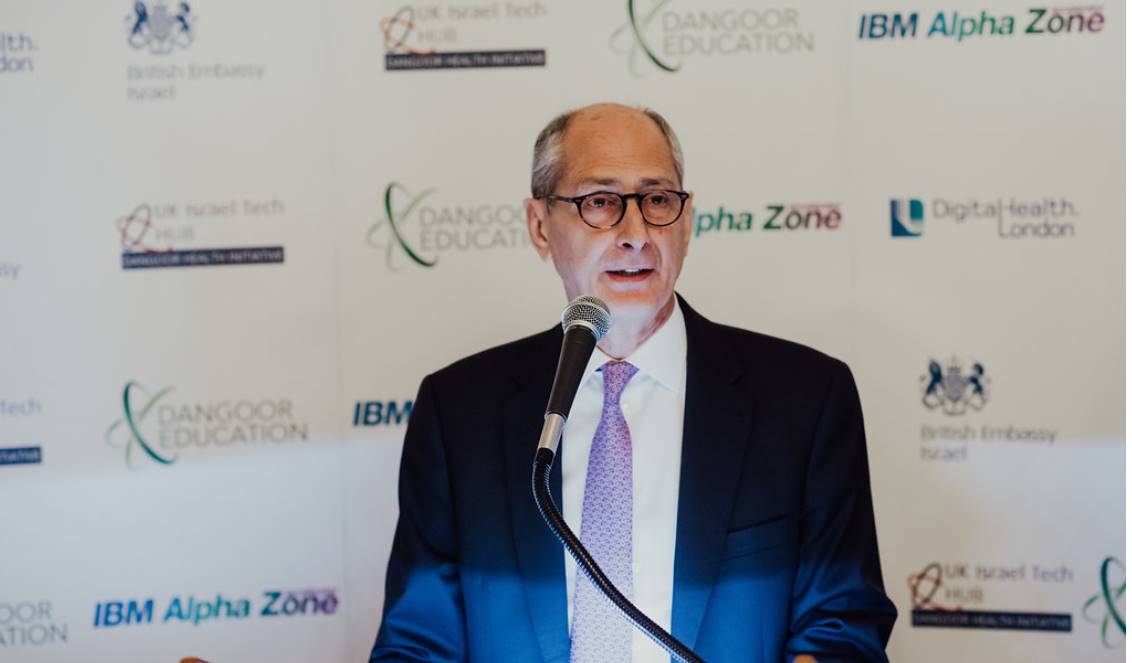The newly launched Dangoor Health Initiative will streamline the best of Israeli digital health innovation into British care. According to David Quarrey, British Ambassador to Israel, the initiative will be “one of the most important things that the embassy does between the U.K. and Israel this year because of the scale of good that it can do.”
“For me, it’s one of my top priorities this year,” he said. “We hope for a transformative impact.”
The initiative, created by the British Embassy’s UK Israel Tech hub, will bring together the scale of the British National Health Service with Israeli innovation and technology in a way that can deliver sound results for people in the United Kingdom.
Every semester, the UK Israel Dangoor Health Initiative will pick Israel’s top two to three scalable, early-stage digital health start-ups for a 20-week accelerator program hosted at the DigitalHealth.London facility. The accelerator will provide the tools, skills and knowledge necessary for the success of startups addressing significant challenges in U.K. health care to work with the United Kingdom.
The initiative is powered by the IBM Alpha Zone accelerator in Israel and supported by DigitalHealth.London, an NHS-backed British delivery partner that will offer mentorship and guidance in operations and market penetration into U.K. health care and the NHS.
According to Quarrey, market penetration is often the biggest hurdle Israeli start-ups face in working in the field of British health care. As ambassador, he notes that he’s often asked about the cultural differences between the two countries, and the health-care system is one of them. “It’s a big and complex organization, and it’s not easy if you’re an Israeli start-up to navigate through it,” he said, “so we hope this will make a big difference.”
David Dangoor, one of the sponsors of the initiative, agreed with Quarrey about approaching the daunting NHS. “Navigating the NHS is a gigantic process,” he told JNS. “The initiative will offer Israel’s start-ups access into that market.”

Although aiding the Jewish state is not the primary intent of this partnership, Dangoor acknowledged that it may lead to such an outcome. “From Israel’s point of view, I have always been conscious of [the] Boycott, Divestment and Sanction [movement], and I think expanding the U.K.-Israel relationship may lead to a stronger immunity to things like BDS.”
As he told JNS, “the Israeli innovators are doing it for the love of their science and for their institutions, but in the back of their minds, they are building their Israel.”
‘Size is not always relevant’
According to Ayelet Mavor, director of the UK Israel Tech Hub, in addition to the benefit for start-ups, the British health-care field will benefit from this new partnership. “This is a unique opportunity for British health care to gain valuable access to Israeli companies and provide them with insights to help ensure their success to better serve U.K. patients,” she said.
Although it might seem odd that the United Kingdom, with a population of 70 million people, could benefit from the contributions of a small country like Israel, Dangoor said “in terms of the Jewish people, we have nearly 900 Nobel prizes, so size is not always the relevant matter.”
He continued: “Israel has a lot to give to the U.K. in this field. I always remind myself that the great founding fathers of Israel set up universities long before they were thinking about buying armaments, and I think this says a lot about what Israel can give.”
Quarrey, too, maintained that the British health system can gain from Israeli innovation. “Like all beloved national institutions, the NHS needs to change and evolve, and it needs to innovate, and that is what the launch of the U.K.-Israel health initiative is all about,” he said.
Now that Israel has this opportunity to save lives through this initiative, it must, stresses Dangoor. “The Jewish people have a saying that if you save one life, you save a whole universe,” he explained. “We are like a child who has opened a treasure chest. Once we see the treasures, we want to get our hands on it. We all have friends, family and close ones who have been affected by disease, and it is our duty to do something now that we have the opportunity to do so.”
At the same time, other British embassies around the world have been responding to this call to action, Dangoor told JNS. “They have reached out asking how they can adopt this partnership model of working with local start-ups to innovate British health care. They are all saying, “Tell us how we can do it!” They want to do what the British Embassy is doing with Israel.”
Dangoor concluded that they’ll probably realize that Israel is the essential ingredient. But, he quipped, “let them find that [out], if that’s the case.”


























